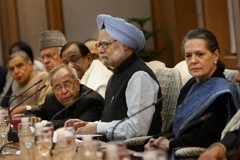Indian politicking
Cabinet finally approves Food Security Bill. Next stop parliament

The long-awaited Food Security Bill sets out to make food a legal right and seeks to provide 5kg of grain every month to some 800m of the country’s poor.
It also aims to provide a kilo of rice at Rs3 (US$0.06), wheat at Rs2 (US$0.04) and millet at R1 (US$0.02) to almost three-quarters of the population. The scheme is likely to cost the government Rs1.3tn ($23.9bn) each year.
A new hurdle
The next step for the bill, which featured heavily in the coalition-leading Congress Party’s manifesto, will be discussion and approval from parliament. If it is approved, it will prove vital for the party’s election hopes next year.
On Monday, the cabinet deferred its decision to approve major amendments to the bill in the absence of three senior ministers, including finance minister P Chidambaram. The trio had made a last-minute dash to Chennai to soothe M Karunanidhi, the former chief minister of Tamil Nadu, who had threatened to remove his DMK Party from the UPA coalition on an unrelated political issue.
The grandee had earlier pledged his support to the Food Security Bill, although it is too early to tell what effect the absence of Karunanidhi’s five central ministers to the passing of the bill through parliament.
Heavy changes
According to sources ahead of the cabinet announcement, more than 55 amendments have been made to the bill since it was introduced in December 2011. Central to the changes include the removal of priority and general beneficiary classifications and providing uniform allocation of 5kg of grain at fixed rates to 67-70% of the country's population.
At the same time, the cabinet has been debating sugar decontrol, one of the last vestiges of the loathed “Tax Raj” days. Under the reforms, the food ministry has proposed the end of the unregulated release mechanism and sugar levy process, through which mills are required to sell 10% of their output to the government at punitively low prices, costing the industry an estimated Rs30bn (US$551m) each year.
Instead, the cabinet is looking to buy sugar on the open market while continuing to sell it through ration shops at a subsidised rate, with raised sugar duties making up the shortfall.
Have your say: What are your thoughts on the Food Security Bill as it makes its way through parliament? Let us know in the box below.

















